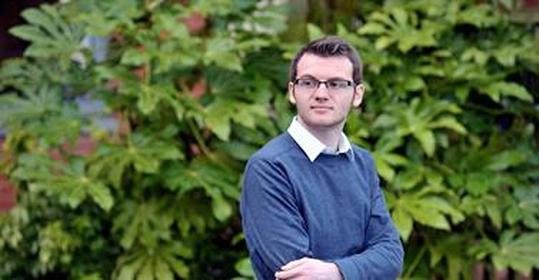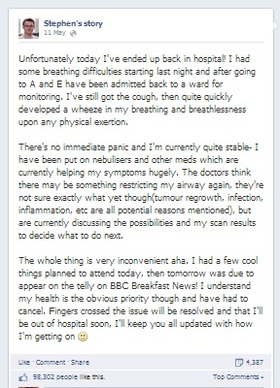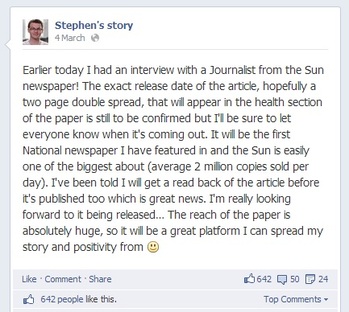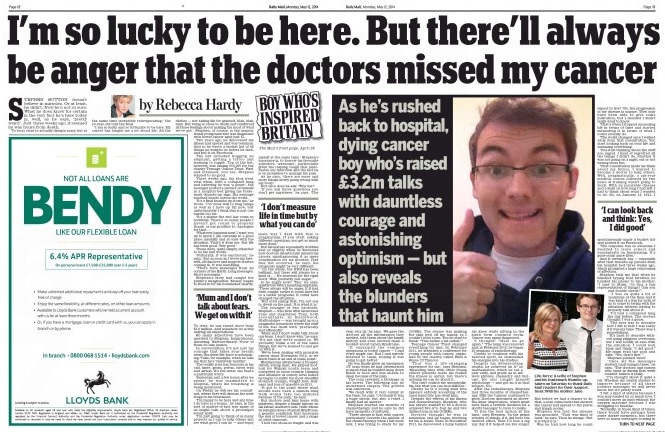Stephen's story: did the Press help his cause - or take over the end of his life?Thursday 15 May, 2014 He looks so composed, self-confident, at ease with himself, a man renowned as a motivational speaker and blogger.
This is Stephen Sutton, who died yesterday aged 19. This is the "boy who inspired Britain". For most of us, our first introduction to Stephen came three weeks ago after he posted a "farewell thumbs up" picture on his Facebook page in the expectation that he had very little time to live. As we know, the picture spread like wildfire and before you could blink, he had easily exceeded his target of raising £1m for the Teenage Cancer Trust. There followed an extraordinary incident in which he "coughed up" a tumour, suddenly found himself able to breathe again, and was able to go home. This apparently upset a few trolls who said they felt conned, duped, that "something doesn't feel quite right here". Stephen apologised for disappointing them. It was but a brief reprieve. On Sunday he updated his Facebook status: 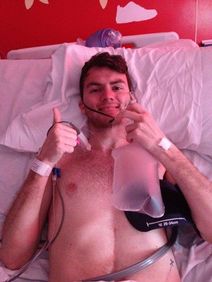
There were to be no further updates. On Tuesday his family took over the page to announce that Stephen's condition had deteriorated and to ask for privacy to spend "whatever time is remaining" with him. The final entry on the page, as we have seen everywhere today, came from his mother to say that he had died.
Since posting that farewell picture, Stephen had become a national hero, a boy who turned a bucket list into a fundraising phenomenon. When he passed the £1m mark, the Mail brazenly stated: "In the 72 hours since his story was featured in the Daily Mail, donations have poured in at an astonishing rate of more than £400,000 a day." Stephen's story had certainly featured in the Mail. But it had been in almost every other paper, too. In fact, it had also featured in the Mail and the Sun a week before that thumbs up photograph. On April 14, the two websites ran stories about Stephen's target. For the Sun it was Incurable cancer teen's bucket list to raise £1m for charity and in the Mail it was Teenager with terminal cancer in race against time to raise £1 million for charity by ticking off the rest of his bucket list. The stories included a stream of identical quotes and neither paper used the "told the Mail/Sun" approach, so it seems likely that the original source was an agency, possibly the Newsteam agency in Birmingham, which is credited on the photographs. Compared with the later surge in interest, response to the reports was muted: 16 comments and 45 shares for the Mail, just two comments for the Sun. That isn't as surprising as it may seem. Too many young people are stricken by cancer - and a lot of them seek to turn it into a positive, raising money for various causes, doing what they can to help others. It gives life a purpose, offers hope of leaving a legacy. There are many inspirational teenagers, so many that their efforts rarely make national headlines. Stephen started with a target of raising £10,000. He decided to increase it to the million only after his total reached £572,000 - and long before a word about him had appeared in the nationals. By then he had done most of the things on his bucket list, appeared at the O2 and the Albert Hall, befriended stars - most notably the comedian Jason Manford - and made two films and written a book. In March he updated his Facebook status: Look at that, 642 likes, 50 comments, 24 shares - a teenager's Facebook page inspires greater response than two national newspapers.
Sadly, the article never appeared in his lifetime. The paper probably regarded it as a timeless piece and it was busy with its breast cancer tie-up with the Copafeel! charity. A weekly health section can't overdo the cancer coverage. 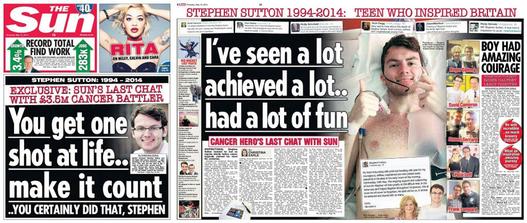
Today, however, the paper's splash is by Christina Earle, a journalist who usually writes for the health pages.
"Gutsy teenager Stephen Sutton lost his fight with cancer yesterday - after declaring in his last interview with the Sun: "You get only one shot at life. I need to make every second count." The paper state four times on the front and inside spread that this is his last chat/final interview with the Sun. And those last three words are key. The impression is that the paper had spoken to Stephen recently. Maybe it had, maybe Earle had been sent back to talk to him after the March interview. Or maybe this was a judicious reworking of a story that had been sitting in a notebook for two months. What is pretty certain is that Stephen's final interview was not with the Sun but with the Mail: 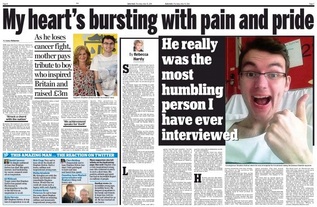
On Monday the Mail ran an exclusive by Rebecca Hardy which carries much that had not appeared in print before. It is an excellent interview, written without flam or sentiment. Today, the paper carries a personal piece by Hardy about conducting that interview. Again, it is worth a read.
A couple of weeks ago, the Mail was claiming credit for Stephen's fundraising success. Today it is humbler and much the better for it. As readers we have been enriched by Stephen's story, as have the coffers of the Teenage Cancer Trust. But did we in turn enrich his last days? There is something about the way the Press have tackled this story that makes SubScribe feel uncomfortable - the petty deception of today's Sun splash, the barrage of offers to help him to complete the bucket list, the sense that the Press were claiming ownership, I can't quite put my finger on it. This Facebook post of May 2 may have something to do with it: "A lot of people want to visit me. As mentioned I am still physically recovering and as much I'd love to, it would not be viable for me to spend time with everyone who wants to see me. I know that everyone means well, but I do need to rest, so direct phonecalls or unexpected visits to my home will not really be appropriate at the moment. If you want to get in touch please just message me via Facebook, Email, etc and I'll see what I can sort. I'm happy to help where I can, but I'm still only human and need to safeguard some kind of privacy for me and my family!" Stephen Sutton was a star in his own world long before Fleet Street had ever heard of him. Remember, he had raised £572,000 without any assistance from the national Press.
He did not become a "hero" because the papers decided he was one. He did not need the patronising endorsements that we see on today's front pages: "You certainly did that, Stephen" in the Sun, "A credit to humanity" from the Mirror. This is what made him special: |
|
|
Please sign up for SubScribe updates
(no spam, no more than one every week or two)
|
|
|

